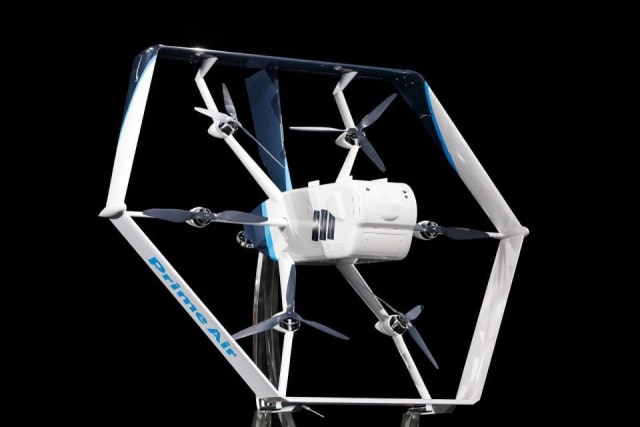Amazon's Prime Air to officially launch drone delivery trial in the US
/cdn.vox-cdn.com/uploads/chorus_image/image/67320314/jeff_wilke_amazon_prime_air_remars_june_2019.0.jpg)
As of today, Amazon is officially an “air carrier.” The Federal Aviation Administration (FAA) granted Amazon Prime Air the designation, which allows Amazon to begin its first commercial delivery trials in the US, Bloomberg reports. The company will use the hexagon-shaped next-gen hybrid drone it showed off last year.
Amazon has been given the Federal Aviation Administration’s approval to operate as a drone airline in the United States, paving the way for it to start offering commercial deliveries on a trial basis, Bloomberg reports. The FAA said that the ruling allows Amazon to “safely and efficiently deliver packages to customers,” according to CNBC, and let its drones carry packages outside of the operator’s visual line of sight.
Amazon has not revealed when or where it will begin its commercial delivery trials, but as Bloomberg points out, it does have test sites in the Northwest and in the nearby Vancouver area. Amazon has also tested drones in the UK. Still, we’re probably a few years away from a commercial drone delivery service. In part because the FAA still needs to define regulations beyond the trial phase.
“This certification is an important step forward for Prime Air and indicates the FAA’s confidence in Amazon’s operating and safety procedures for an autonomous drone delivery service that will one day deliver packages to our customers around the world,” David Carbon, an Amazon vice president, said in a statement.
Amazon is not the first drone operator to receive FAA approval. Alphabet subsidiary Wing and UPS are also operating FAA-approved trials. In Virginia, Wing is delivering over-the-counter meds, snacks and gifts on behalf of FedEx, Walgreens and a local retailer. UPS is delivering prescriptions for CVS in North Carolina.
The milestone has been a long time coming for Amazon, which announced its Prime Air plans way back in 2013. But hardware limitations, not to mention health and safety regulation, presented big challenges for the company. It made its first successful drone delivery in Cambridge, England in 2016, but a regular commercial service never followed. Even now, Bloomberg notes that there are numerous hurdles standing in the way of Amazon and its competitors making routine deliveries. The FAA is expected to finalize new rules about flying drones over crowds before the end of the year
Amazon has been openly discussing its drone delivery ambitions for years, but the pandemic may serve as an added push for the company. Amazon has seen a massive uptick on online sales in the past few months -- enough to double its profits last quarter. It has hired more than 100,000 additional workers, but it seems that delivering orders via flying and rolling delivery bots may be another part of its plan to keep up with the added demand.
Amazon told Bloomberg that it intends to begin making delivery tests, but it declined to provide further details.
Last year, Amazon unveiled the latest version of its delivery drone, which is able to take off vertically like a helicopter and then fly forward like an airplane. Amazon said that its intention is to produce electric drones capable of flying as much as 15 miles, to deliver packages weighing under five pounds, and to do so in 30 minutes or less. At the time, Amazon said it was intending to start delivering packages “in a matter of months,” but the service has yet to materialize.
Amazon is far from the only company to have gained FAA certification, Bloomberg notes. Google’s sibling company Wing secured its approval to make deliveries last April, and later claimed the title of being the first commercial drone delivery service in the US when it started offering deliveries in Virginia later that year. UPS has also been trialing using drones to transport medical supplies in North Carolina in partnership with Matternet.



